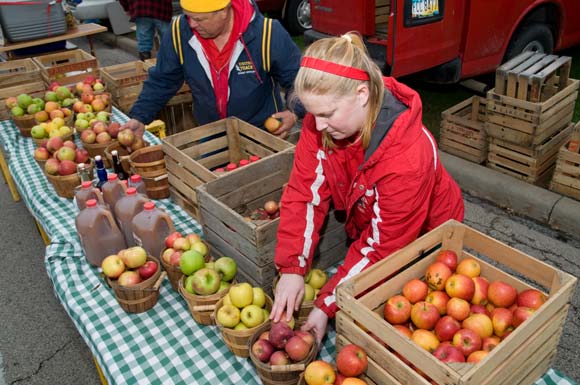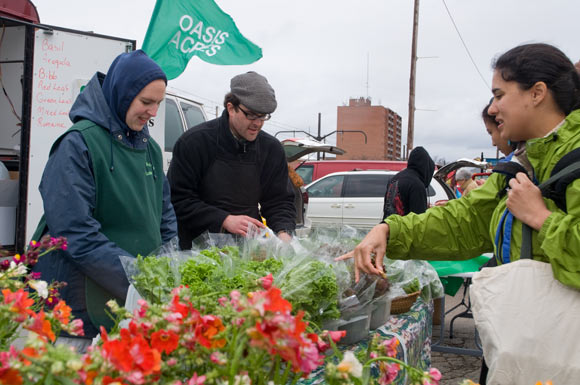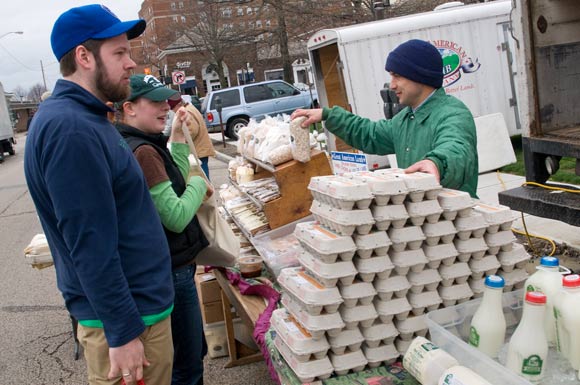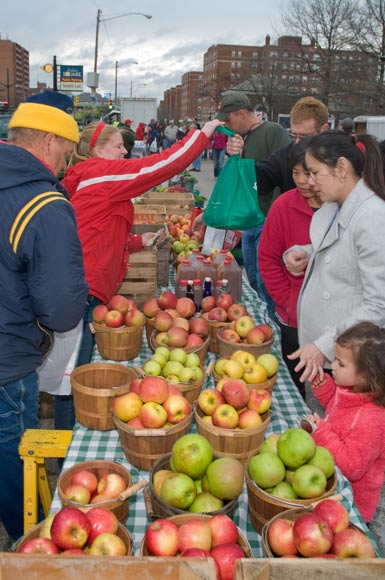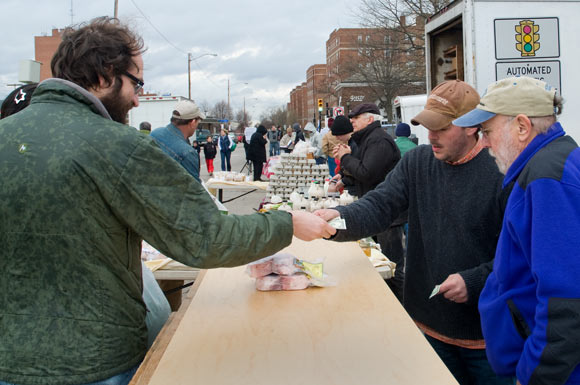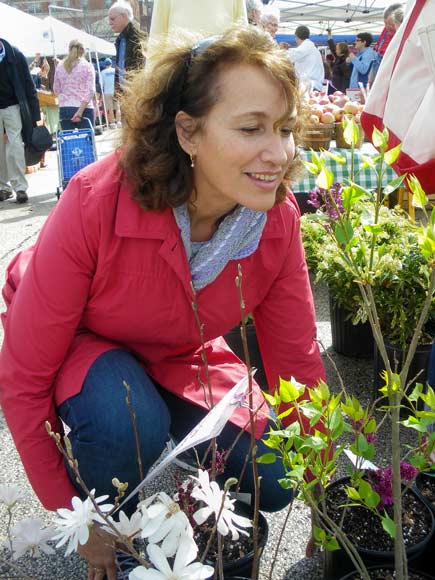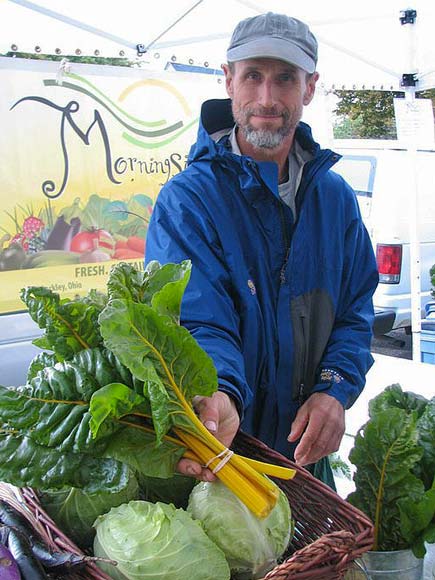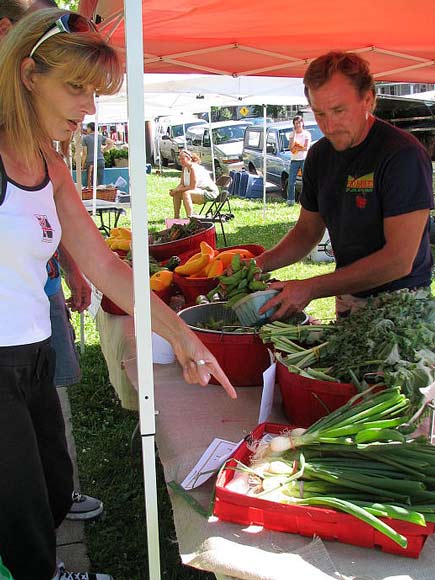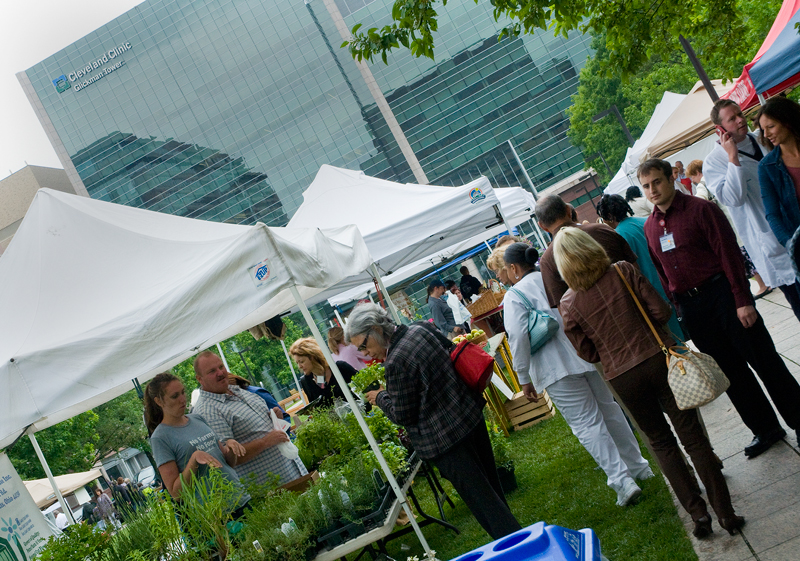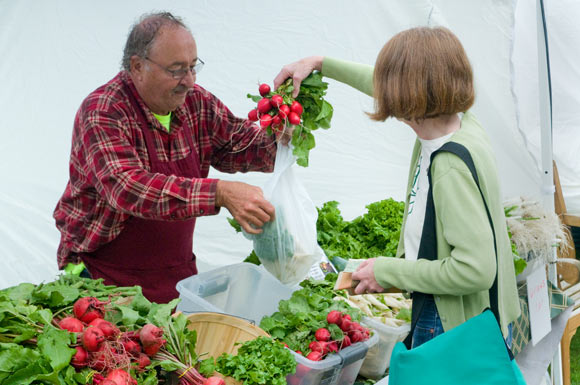clevelanders bullish on farm markets to the tune of $2.5 million
It's a blustery spring morning in Cleveland's Shaker Square neighborhood and the North Union Farmers Market is in full swing. Hundreds of customers, many clutching cloth bags and pulling carts, are shopping the couple-dozen stands offering produce, meats, eggs, cheese, pastry and pie -- all grown or made within 100 or so miles from here.
Scott Boehnlein is doing a brisk trade in chops and sausages, made from livestock raised on his Chardon-based farm New Creation. Glen and Lois Smucker, owners of Orrville's Oasis Acres, are popular for their fresh-picked lettuces and herbs. And customers can't seem to get enough of Jean Mackenzie's artisanal goat cheese, handcrafted 30 miles away in Hiram.
And it's only April, and it's about to rain.
Come high season, Shaker Square's Saturday morning farmers market will see upwards of 6,000 daily shoppers perusing the wares of more than 100 vendors, reports Donita Anderson, founder and executive director of North Union Farmers Market. Throughout the year, the various markets will attract over half a million people.
Clevelanders are having a love affair with locally grown, seasonal food -- and the city's rapidly expanding web of farmers markets is where that romance is blooming. These days, it's possible to shop at a different neighborhood farmers market practically every day of the week, a far cry from a few years back when just a handful of options existed.
Take North Union, which launched the Shaker Square market back in 1995. Today, the nonprofit runs eight Cleveland-area farmers markets, including mid-week markets at Cleveland Clinic and Cleveland State University. Additional markets also have popped up in Tremont, Detroit Shoreway, West Park and on Public Square. And the list continues to grow. This year, University Circle will host a market at its popular Wade Oval Wednesdays (WOW) summer concert series.
So, what exactly is luring shoppers away from the supermarket and toward the farm market? In-season, locally grown fare just tastes better, say some.
"You really notice the difference in flavors," says José Solá, a regular at the Shaker and CSU markets. "One time I bought radishes and the spiciness was incredible as opposed to the dullness of what you get elsewhere."
Adds Danielle van Heeckeren, whose pull cart was brimming with everything from milk to pasta as she worked her way through the stalls: "We get eggs always. We don't buy eggs at the store anymore at all. We do fruit when it's in season. We buy mushrooms, and we discovered the broccoli in the fall and that's a real treat."
This enthusiasm for farmers markets is proving to be a boon not only for the bellies of local shoppers, but also for the bottom line of local economies.
By definition a true farmers market is where shoppers buy directly from the folks raising the meat, growing the veggies, and culturing the cheese. While precise parameters vary, most markets require their vendors be located less than 100 miles away. This means that money spent at the market stays in the region.
And it is not an insignificant haul, according to the agencies that track those figures.
North Union, by far the biggest game in town, projects its vendors will take in more than $2 million in 2011, up about 20 percent from last year. Contrast that to the market's first year in operation, when the handful of vendors hauled in about $15,000 -- collectively. Add in the rest of the local markets and you get a figure that approaches $2.5 million per year.
Every $100 spent locally yields a return of about $45 to the local economy. Every $100 spent at a national retailer, however, returns just $15. This is what's known as the multiplier effect, and why it is so important to buy local.
For many of the region's small farms, most of which are family-owned, these urban markets have become their principal way of doing business.
"There is no other way for us to sell our stuff except for people coming out to our farm in Chardon," explains New Creation's Boehnlein. He estimates that a full three quarters of his revenue is generated at farmers markets.
For many, farmer markets have been the difference between success and failure. Without this steady access to customers, many small farms might be forced to shut down, clearing the way for yet more urban sprawl.
"Since we've been able to sell at the market, we are finally turning just a bit of a profit," explains Lois Smucker of Oasis Acres. "Without the market, we would have had it pretty rough over the years and might have had to quit like many of our friends."
Some of the farmers' best customers, of course, are the chefs, who seem to have an insatiable appetite for local, sustainable ingredients. "We've met all our chefs at the market," notes Smucker.
Matthew Mathlage, chef and owner of Ohio City's Light Bistro, buys greens from Oasis Acres. "We use local farmers to source everything on our menu," he says. "And I made a lot of those connections at the farmers markets."
Small farmers aren't the only folks reaping the rewards of Cleveland's thriving markets. Numerous small businesses also are getting a boost. Last year, North Union's vendors included more than 60 crafts people and 50 purveyors of prepared foods.
"The farmers market opened up a whole new avenue of business for us," says chef Ben Bebenroth of Spice of Life Catering, who for years has been selling breakfast burritos and other prepared foods at the markets. "We did the burrito stand for a couple of years and now people trust us -- they know the name Spice of Life."
Indeed, Spice of Life is now one of the city's most popular caterers, landing gigs at the Cleveland Museum of Art and numerous private affairs. This year, Bebenroth anticipates his company's revenue will top $500,000.
This is just one of the many examples, says Anderson and other market managers, of how the impact of the markets can be felt well beyond the market proper.
"Some of these things are just not measurable," observes Jody Lathwell, market manager of the Tremont Farmers Market. "But our market has become a real place to gather."
Lathwell estimates that up to 500 shoppers attend the Tuesday evening market, and local business has certainly taken note. Tremont's Bistro on Lincoln Park is planning a special Wednesday night dinner service that features items from the previous day's market. Meanwhile, Shaker Square's Fire Food and Drink recently added Saturday brunch service, a response to the robust crowds at the market.
Even as rain begins to fall on Shaker Square, the vibe is upbeat. Shoppers pop into Deweys for a cup of coffee or into a nearby restaurant for a bite to eat.
Having sold much, if not all, of what they brought that morning, the visibly pleased farmers pack up their gear and load it into their vans, pick-up trucks, and hatchbacks.
"What should happen at the market is that farms sell the whole truckload. If that happens you have a successful market," says Anderson. "We try real hard and they look real happy."

